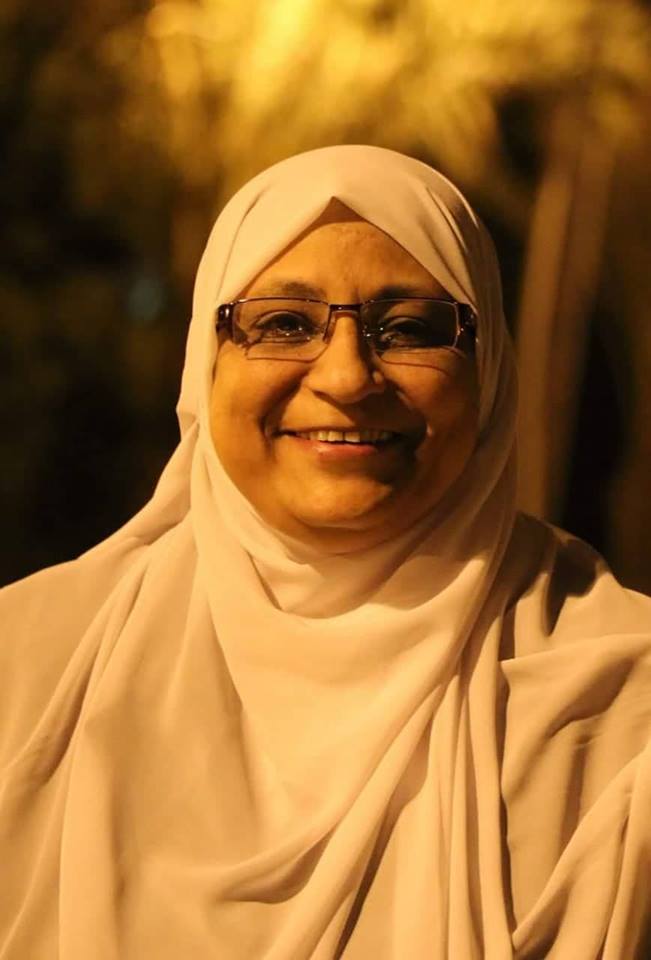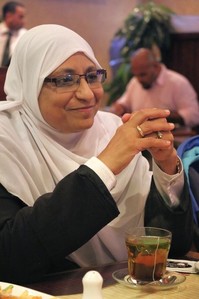On March 05, an emergency court convicted human rights lawyer, Hoda Abdelmoniem on bogus charges stemming from her human rights work. She was sentenced to five years’ imprisonment following a grossly unfair trial.
During a rare prison visit on June 26, her family learned that her health had deteriorated further and she had developed inflammation of the nerves. Despite this and her additional serious health problems, including kidney disease, a heart condition arterial thrombosis, and high blood pressure, the authorities continue to deny her the healthcare she needs.
Here’s what you can do:
Write to the President of Egypt urging him to:
- Ensure that Hoda Abdelmoniem and others convicted in connection to the Egyptian Coordination for Rights and Freedoms case are immediately and unconditionally released and that their convictions and sentences are quashed as they stem solely from the peaceful exercise of their human rights.
- Pending her release, guarantee that she is provided with regular access to her family and lawyers, and the healthcare she needs, including outside prison if necessary.
Write to:
President Abdelfattah al-Sisi
Office of the President, Al Ittihadia Palace
Cairo, Arab Republic of Egypt
Fax: +202 2391 1441
Email: p.spokesman@op.gov.eg
Twitter: @AlsisiOfficial
Salutation: Your Excellency:
And copy:
His Excellency Ahmed Abdallah Ibrahim HAFEZ
Ambassador
Embassy of the Arab Republic of Egypt
454 Laurier Avenue East
Ottawa, ON K1N 6R3
Tel: (613) 234-4931, 4935 Fax: (613) 234-9347/234-4398
Email: embassy.Ottawa1@mfa.gov.eg
Background
On November 1, 2018, National Security Agency forces (NSA) broke into the house of Hoda Abdelmoniem in Cairo at 1:30 am, ransacked it, and took her away blindfolded. She was subjected to enforced disappearance for three weeks after her arrest until she was brought to the Supreme State Security Prosecution (SSSP) for investigation. She was then taken back to an undisclosed location.
Her family briefly saw her again on November 24 and 28 2018 at the SSSP office. She was subjected to enforced disappearance again between December 2, 2018, and January 14, 2019, as authorities refused to disclose her whereabouts to relatives and lawyers.
On the day of Hoda Abdelmoniem’s arrest, on November 1, 2018, the Egyptian authorities launched a series of raids, arresting at least 31 human rights defenders and lawyers; 10 women and 21 men. The Egyptian Coordination for Rights and Freedoms (ECRF), which documents enforced disappearances and the use of the death penalty, and provides legal aid to victims of human rights violations, was particularly targeted by the crackdown. In a statement published on November 1, 2018, announcing the suspension of its human rights work, ECRF cited the situation in Egypt as incompatible with human rights work and demanded the UN Human Rights Council to intervene.
Right to health
On November 30, 2020, Hoda Abdelmoinem’s family learned from other prisoners’ relatives that she was taken to the prison hospital before being transferred to an external hospital after suffering from severe pain. While her loved ones have been denied access to her medical records by prison authorities and therefore don’t have detailed information about her condition, they were informed by other prisoners’ families that one of her kidneys had failed, while the other was functioning poorly.
On December 1, 2020, the interior ministry publicly claimed that she has been provided with healthcare and does not suffer from serious medical conditions. During a court hearing held on October 11, 2021, Hoda Abdelmoniem told the judges that the prison doctor said she required cardiac catheterization and requested her release on medical grounds.

Unfair trials
On August 23, 2021, the SSSP referred Hoda Abdelmoniem as well as human rights defender and founder of the ECRF, Ezzat Ghoniem, Aisha al-Shater, daughter of Muslim Brotherhood leader Shairat al-Shater, and lawyer Mohamed Abu Horira, as well as 27 other defendants to trial in front of an Emergency State Security Court (ESSC).
The SSSP indicted them on various charges, including membership in a terrorist group (the Muslim Brotherhood), disseminating false news about human rights abuses by security forces through a Facebook page titled “the Egyptian Coordination for Rights and Freedoms”, funding a terrorist group and possession of pamphlets to promote the terrorist group’s objectives.
On March 5, 2023, an ESSC convicted 30 defendants and sentenced them to prison terms ranging from five years to life; one defendant was acquitted. The court also ruled to add the 30 convicted defendants to the “list of terrorists” which leads to asset freezes and travel bans and place them on police probation for five years after prison.
On June 8, Hoda Abdelmoniem’s family learned that she was transferred to 10th of Ramadan prison from al-Qanater women’s prison; and were able to visit her for the first time since August 2022.
Neglect & ill treatment
She told them during the visit that prison authorities in al-Qanater women’s prison confiscated all her belongings including medicine and a radio before the transfer. The confiscation of the radio means that she no longer has access to news in 10th of Ramadan prison.
She added that she was feeling more isolated in the 10th of Ramadan prison as a result of no longer being abreast of news, sharing the cell with prisoners not held for political reasons and the prison authorities’ banning her from exercising in the yard with other prisoners.
On October 25, 2021, President Abdel Fattah Al-Sisi announced that he would not extend the state of emergency, in force since 2017, which allowed for the creation of ESSCs. Article 19 of the law governing the state of emergency stipulates that ongoing trials are to continue even after the state of emergency is no longer in force. Proceedings in front of ESSCs are inherently unfair.
Defendants are denied the right to appeal their convictions and sentences to a higher tribunal. Other documented fair trial violations include the right to have adequate time and facilities for the preparation of their defense, right to communicate with counsel of their own choosing and right to a public hearing.
Attack on human rights defenders
In addition, judges at the ESSC routinely deny requests by lawyers to photocopy casefiles, which in some cases exceed 2,000 pages, instead instructing them to review them in court. Prosecutors and judges have also failed to provide copies of indictment orders to defendants and their lawyers, undermining their right to be informed of the exact nature and cause of charges against them.
Hoda Abdelmoniem volunteered as a consultant for the ECRF and had been active in documenting human rights violations including cases of enforced disappearances. She is a former member of the National Council for Human Rights and of the Egyptian Bar Association. On November 27, 2020, the Council of Bars and Law Societies of Europe granted its 2020 Human Rights Award to Hoda Abdelmoneim and six other detained lawyers in Egypt.




























